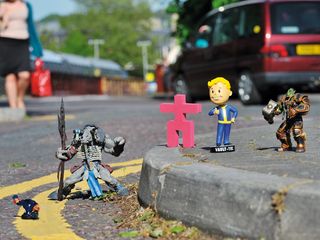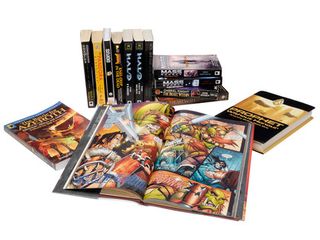Beyond the game: the world of the spin-off
The best and worst of the comics, toys, fiction and more

The strange thing about gaming is that if you exclude roughly 98 per cent of the Japanese export market not covered by anime, Pocky and deeply bizarre porn, it's spawned relatively few cottage industries.
A new release typically hits the shelves, vanishes with the tide of technology, then gets forgotten, except for nostalgia purposes.
It's only in the last few years that some of the spin-offs have started being treated with anything approaching respect: Halo novels have hit the New York Times bestseller lists, game posters and swanky action figures take a proud place in all geek-friendly stores, and movie conversions… well, sad to say, those still invariably stink.
Still, things are definitely on the rise. Everything from conventions to the seriousness that spin-offs and fan-projects are being treated to is rapidly improving, often to the point that if you don't take part, you're only getting part of the story.
World of Warcraft is the king here, with much of its backstory restricted almost entirely to spin-off materials. If you want to know why the King of Stormwind, former gladiator Varian Wrynn, is so keen on waging war with the Horde, you need to buy the comics.
To find out what the current biggest baddie was up to before the recent patch, you'll need a copy of the new book Arthas: Rise of the Lich King. You can get the basic details of the story online via one of the many Warcraft wikis, but probably without the same atmosphere.
Play a good book
Get daily insight, inspiration and deals in your inbox
Get the hottest deals available in your inbox plus news, reviews, opinion, analysis and more from the TechRadar team.
Books about games have been around for decades, and have often been very, very strange. There was a paperback based on the original Leisure Suit Larry games – The Larry Story – that was largely a half-hearted narrative version of the first game's plot.
There were novellas shipped with many other titles, often for use in copy protection quizzes (type in page 5, paragraph 4, word 1 and the like) and bolstering or explaining away the actual game's primitive technology.
The Elite games used short stories to give the illusion of a bustling future world for you to trade in, while Starglider handwaved its wireframe graphics by pretending they were a tactical aid. Not necessarily convincing, but better than nothing.

FAN FICTION: Some good and some bad, the fan fiction of games takes many different forms
Commercially speaking though, things don't get much stranger than the Doom novels. Yes, you read that right. There are six of them – four nominally based on the original game, and two more recent ones about Doom 3. The originals are true… we hesitate to use the word 'genius', but let's be honest, anyone who can get four novels out of the original Doom deserves something.
The first, Knee Deep In the Dead, covers the entire original trilogy without pausing for breath. Instead of a mute psychopath, it stars a slightly sarcastic marine called Fly, hunting for a female marine in a world of omnipresent danger and teleporters with a habit of stripping travellers naked in the name of making them have really awkward conversations.
Book 2 is nominally about Doom 2, but with some major deviations – not least that the demons are aliens trying to prey on humanity's psychological weaknesses and the Mormons are our last line of defence.
Then it gets weird. Really, really weird. The alien race is named Fred. They're fighting another group of aliens called the Newbies, whose emissaries are a pair called Sears and Roebuck. By the end of the series, it's as far from Doom as Piers Morgan's arse is from a Nobel Peace Prize, and not in a good way. Most books are slightly more sane.
There have been series based on Wing Commander and Myst, Tomb Raider, Splinter Cell, Mass Effect, Halo, Hellgate: London and many others, including one-shot efforts, like Anarchy Online: Prophet Without Honor, Hitman and Starship Titanic, as written by Terry Jones of Python fame.
Some, including Wing Commander: The Price of Freedom and Gabriel Knight 1 and 2 are effectively retold versions of the plot, often from the original writers, who get to put back things they weren't able to get into the original game.
Anarchy Online is easily the most ambitious, telling a story that stretches from there here-and-now, right through to 28708. It's very, very Dune…
The Halo books are among the most popular conversions, and with good reason. Halo: The Fall of Reach in particular is a good read for fans, detailing the Master Chief's training before encountering Halo, with the others telling different stories from around its universe. Bungie considers these canon (with the rule that the games' stories win in the event of a clash), making them a worthwhile read.
Some games haven't fared as well, The Baldur's Gate 2 novel is a particular stinker, not least for its odd deviations, such as placing one of the female characters in a bizarre dark elf lesbian scene, and restricting important characters to mere cameos.
Planescape Torment didn't fare much better. When your main character is called The Nameless One, it's a bad sign when he gets a name within the first few chapters. Still, it could be worse. The hero of Command and Conquer: Tiberium Wars has to go the whole story suffering under the callsign 'Puke'.
Comic relief
Given the iconic nature of many of the games chosen for conversion, comic books are often seen as a better destination. There are Tomb Raider novels, but really, if things are going to start glistening after a quick dip in some ancient Mayan river, you may as draw the damn picture.
There aren't as many comics as you might think, and most of them, like, say, Bloodrayne, are every bit as forgettable as their games. Some are interesting however, including twelve issues of the already comic book themed City of Heroes that never really meshed with the game world like it should have done, and a one-issue special based on Doom that actually made the novels seem sane. Simply called Knee Deep in the DEAD!, it has to be seen to be believed.
And thanks to the internet, you can. Visit the Doom comic site and savour the narrative genius of lines like: "At this particular moment in time, I don't believe I have a healthier or more deep-felt respect for any object in the universe than this here shotgun…"
One very useful function of comics is setting up a game's backstory outside of the pace and focus that the actual game requires. Mirror's Edge and Dead Space comics took place before the action kicks off, introducing the environment and setting things up. You don't need to know any of it to enjoy the games, but it's a good way of getting into bits of the story that people who just want the boobs and explosions would find gratuitous.
